AM Suspension Parts Makers in Taiwan Hold Up Well Amid Global Recession
2009/04/20 | By Quincy LiangWhile the global automakers skid to the brink of insolvency, with Saab filing for bankruptcy, Opel trying to part ways with its American parent GM, and sales of Toyotas in the U.S. having dived more than 30% in December 2008, not all the news is doom and gloom in the automotive industry, especially signs surrounding some major Taiwanese makers of aftermarket (AM) suspension parts.
The 2008 operating results for Taiwanese AM auto parts makers clearly show they have been spared by the extensive impact of the global downturn, and instead had achieved stable growth regardless of attempts by global buyers to minimize inventory levels. Rather than cutting back as many are doing across the business world, Taiwanese AM parts makers are kicking off projects, obviously showing aggressive expansion plans.
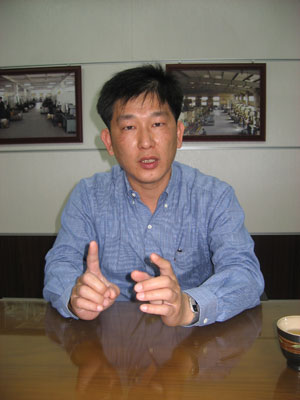
Amid the general malaise seen in the global economy, some insiders say that the recession may actually work for AM auto parts. With less disposable cash and tightened credit, drivers may hold off replacing aging cars, which would trigger more demand for AM parts to keep cars running properly. Such belief may be confirmed by the promising performance of AM auto parts suppliers in Taiwan to date. One development is for sure occurring: the war of attrition that is gradually weeding out smaller, poor-quality and financially-weak players from the global market, especially players in China.
With global oil prices declining somewhat and various nations subsidizing new car buys or replacing older cars, rising car sales will help the recovery of AM auto parts sector, which is also expected to rebound soon when low inventories at worldwide parts distributors need replenishing, releasing orders to competitive players who have survived.
Some major AM suspension-parts makers in Taiwan are getting ready for the eventual recovery of global economy: they are buying land to set up warehouses-the best way to avoid idling production lines, with the extra storage allowing them to inventory ample product lines that can be delivered promptly if necessary. Some of them are also targeting upmarket segments, making higher-end products for German luxury cars to widen product mix and enhance technologies.
Biggest AM Supplier for American Cars
One of the above-mentioned examples is Shih Hsiang Auto Parts Co., Ltd., which just bought land next to its factory in central Taiwan and plans to set up a warehouse to keep more materials, key components, semi-finished products and finished items, despite its existing NT$400 million to NT$500 million (US$11.4 million to US$14.3 million at US$1: NT$35) in inventory of semi-finished products.
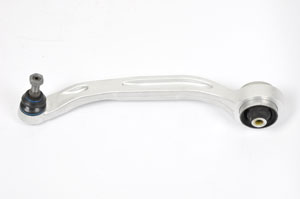
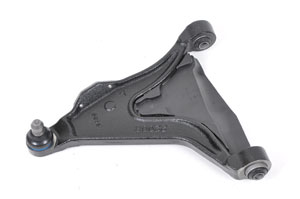
Keeping semi-finished products, according to Shih Hsiang president Kevin Chou, enables immediate assembly into finished products for short lead times. Chou also says that storing semi-finished items saves cost and storage space, while his company works with a well-established satellite-plant system that can immediately supply key parts.
Established in 1978, Shih Hsiang specializes in manufacturing AM suspension and steering parts, being the largest and most comprehensive supplier of its kind in Taiwan. Supplying over 900 control arm models for almost all popular Japanese, European and American cars, according to Chou, his company is widely recognized in the industry as the world's largest and most-comprehensive supplier of AM control arms for American cars.
Shih Hsiang achieved a 5% revenue increase in 2008 and has steady orders for 2009. "Our company has grown steadily for 30 years and we never stop R&D projects."
"Price is no longer the decisive factor, though still important in our competitive business," Chou says, "with product quality, delivery time, and services being more important."
More Service-oriented
"Shih Hsiang has been aggressively transforming from manufacturing-oriented into service-oriented operation," Chou points out. The company operates a plant in Taiwan with around 100 employees, and another factory in Shanghai, China with over 260 people. The total annual output from both factories is 1.2 million to 1.3 million control arms, with about 90% of the pressing done in China and all the forging in Taiwan.
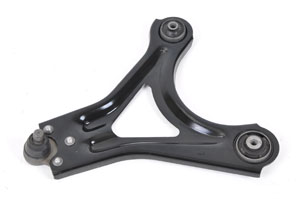
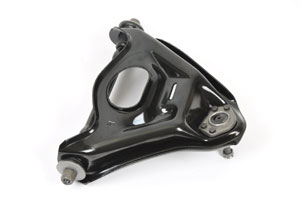
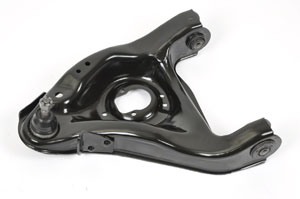
To continually widen its line, Shih Hsiang develops an average of 50 new items per year, with an annual R&D investment of NT$80 million to NT$100 million (US$2.3 million to US$2.9 million). Backed by the most advanced manufacturing equipment as computerized numerically controlled (CNC) machines, welding robots etc., the firm is internationally famous for being able to handle small-batch, large-variety orders and a plentiful inventory.
To build corporate image, Shih Hsiang began a branding program late 2008, with its own SH-brand being the leader in AM suspension-parts in many markets as Russia, mainland China, Eastern Europe etc.
"As an AM parts maker, we can't get creative in terms of design and material specs but have to follow the OE specs as closely as possible," Chou states. "What we can do is assure the highest product quality, which at Shih Hsiang is no longer a problem as are basic terms, price, fastest delivery, and most satisfactory services."
Price competitiveness hinges on a company's efforts to cut cost. Shih Hsiang, for example, constantly reviews its production processes to achieve optimal rationality, as well as negotiate with key-component suppliers over cost cutting and production efficiency. "Basically, Shih Hsiang's products are clearly positioned and are not targeted at low-priced segments," Chou says.
"Prompt delivery is not as easy as it sounds, but is achieved via complicated management," Chou points out. "Shih Hsiang maintains a very reasonable level of materials, key components, and semi-finished products at our plants in Taiwan and China, enabling prompt delivery in most cases. Many challenges in fact have to be overcome to achieve prompt delivery. For example, material shortage due to rising prices is but one such obstacle for many companies."
Chou is very proud of his company's service capability. "Prompt response, providing useful market and related information, strategic development of new products etc. all help to ease doing business for our customers."
"Facing perhaps the worst financial turmoil, we can afford to cut all costs except that for consistent new-product development," Chou says. "The passing of the tsunami will be followed by strong demand immediately and a comprehensive market reshuffle, which will further strengthen the strong but render obsolete the weak. A sign of Shih Hsiang's aggressive product development is its ability to develop new items for launch concurrently with that of a new car, regardless the demand for replacement AM parts peaking three to five years later."
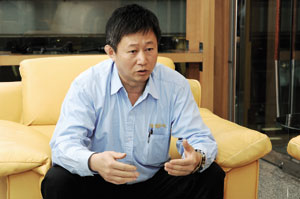
Immune From Recession
Another firm that embodies immunity from the global recession to steadfastly expand is Hwang Yu Inc. Since its establishment in 1972, the company has gradually evolved into a sizable supplier of high-quality AM automotive steering and suspension components in Taiwan and worldwide, with its main products being ball joints, tie rod ends, rack ends, control arms etc.
With a product range of about 4,500 items, Hwang Yu introduces about an average of around 100 new items yearly, realized by its aggressive R&D investment of around NT$50 million (US$1.5 million) annually.
S.H. Fong, Hwang Yu's vice president, claims that his company's industry over the past 40 years has paid off, with the firm not only achieving steady growth but also remarkable sales in 2008 amid the global financial turmoil.
"The year 2009 is an important transition for Hwang Yu, which will make key changes for sustainable operation in the next 40 years," Fong says. "This year is fortuitous for we have accumulated enough momentum to upgrade, while the global financial fallout is a perfectly timed market reshuffle that will make us stronger."
According to Huang, the firm, already an internationally famous supplier of steering parts for Japanese and American cars, is expanding its product lines to cover luxury European cars, including Mercedes-Benz, BMW, Audi, Opel etc. At the same time, the vice president claims, Hwang Yu will also attempt to make a quantum leap-progressing from a mere OEM into an ODM (original design manufacturer)-meaning the firm may actually try to independently develop parts for targeted popular European cars. Such ambitious program calls for, Fong says, boosting the R&D investment by 20% to 30% per year, to a record high of NT$60 million to NT$70 million (US$1.8 million to US$2.1 million).
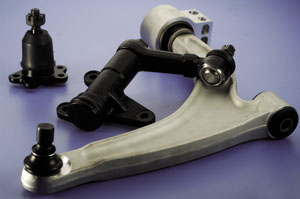
Hwang Yu is also eyeing the original equipment (OE) parts market: Fong claims that the company is set-with sufficient quality, production efficiency, cost control, and management skills-to step up to be a first- or second-tier OE steering-parts supplier globally. The vice president believes, despite the grave impact from the faltering global automotive industry, that truly capable, competitive newcomers can find new windows of opportunities in automotive supply chains worldwide.
Upgrading Products
Having installed new, advanced equipment at its plant in central Taiwan, Hwang Yu is also engaged in a product-upgrading program-for example, building lightweight aluminum-alloy control arms with built-in ball joints.
Hwang Yu distributes most of its steering parts globally under its private labels "Three Five" and "Three Star," with the rest supplied on an original equipment manufacturer (OEM) basis to many global brands. Over 40% of Hwang Yu's parts are shipped to the U.S., 20% to 30% to Latin America, and the rest to other markets.
Having set up a plant in Taiwan and another in Xiamen, Fujian Province, China also helps Hwang Yu fully meet various requirements for quality, price, and shipment location, effectively tapping local advantages for mutual gains.
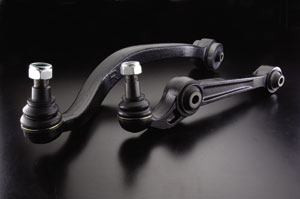
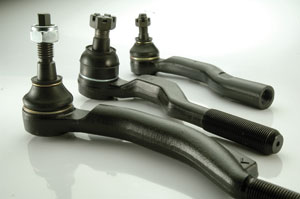
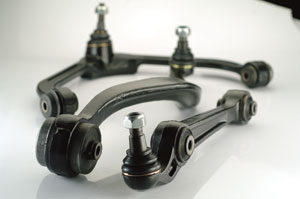
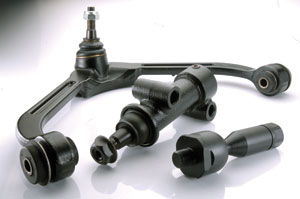
Established in 1992, the factory in China employs over 400 workers to turn out around 300,000 to 500,000 steering parts, as well as brake discs and drums per month. In 2009, the plant is set to diversify product lines into safety-critical brake calipers.
The plant in Taiwan turns out around 300,000 to 500,000 parts per month with about 100 workers, a modest number due to the sound satellite plant system on the island. Besides filling small-batch, large-variety orders, the Taiwan factory also develops new products, as well as offers technical support to its Chinese plant.
Hwang Yu's China facilities is a perfect complement to its Taiwan counterpart, with the former handling big-volume, lower-priced products, as well as orders asked to be shipped directly from China.
Also savvy to wield the advantage of ample inventory, the company keeps at its Taiwan plant and two nearby warehouses hundreds or even over a thousand popular items. "As long as an order is not too big," Fong claims, "Hwang Yu can tap its stock to deliver such items in 10 days, compared to on-average 45 days-the typical lead time.

